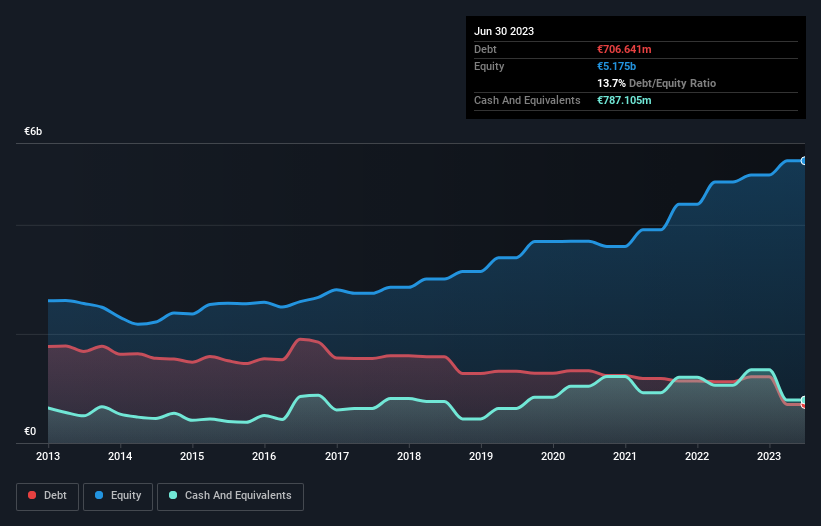Some say volatility, rather than debt, is the best way to think about risk as an investor, but Warren Buffett famously said that 'Volatility is far from synonymous with risk.' So it seems the smart money knows that debt - which is usually involved in bankruptcies - is a very important factor, when you assess how risky a company is. We note that Buzzi S.p.A. (BIT:BZU) does have debt on its balance sheet. But is this debt a concern to shareholders?
When Is Debt Dangerous?
Generally speaking, debt only becomes a real problem when a company can't easily pay it off, either by raising capital or with its own cash flow. If things get really bad, the lenders can take control of the business. While that is not too common, we often do see indebted companies permanently diluting shareholders because lenders force them to raise capital at a distressed price. Of course, plenty of companies use debt to fund growth, without any negative consequences. The first step when considering a company's debt levels is to consider its cash and debt together.
Check out our latest analysis for Buzzi
What Is Buzzi's Net Debt?
The image below, which you can click on for greater detail, shows that Buzzi had debt of €706.6m at the end of June 2023, a reduction from €1.12b over a year. But on the other hand it also has €787.1m in cash, leading to a €80.5m net cash position.

How Healthy Is Buzzi's Balance Sheet?
Zooming in on the latest balance sheet data, we can see that Buzzi had liabilities of €746.5m due within 12 months and liabilities of €1.37b due beyond that. Offsetting this, it had €787.1m in cash and €782.4m in receivables that were due within 12 months. So its liabilities outweigh the sum of its cash and (near-term) receivables by €549.4m.
Given Buzzi has a market capitalization of €4.98b, it's hard to believe these liabilities pose much threat. Having said that, it's clear that we should continue to monitor its balance sheet, lest it change for the worse. Despite its noteworthy liabilities, Buzzi boasts net cash, so it's fair to say it does not have a heavy debt load!
The good news is that Buzzi has increased its EBIT by 3.1% over twelve months, which should ease any concerns about debt repayment. There's no doubt that we learn most about debt from the balance sheet. But it is future earnings, more than anything, that will determine Buzzi's ability to maintain a healthy balance sheet going forward. So if you're focused on the future you can check out this free report showing analyst profit forecasts.
Finally, a company can only pay off debt with cold hard cash, not accounting profits. While Buzzi has net cash on its balance sheet, it's still worth taking a look at its ability to convert earnings before interest and tax (EBIT) to free cash flow, to help us understand how quickly it is building (or eroding) that cash balance. In the last three years, Buzzi's free cash flow amounted to 48% of its EBIT, less than we'd expect. That weak cash conversion makes it more difficult to handle indebtedness.
Summing Up
While Buzzi does have more liabilities than liquid assets, it also has net cash of €80.5m. And it also grew its EBIT by 3.1% over the last year. So we are not troubled with Buzzi's debt use. The balance sheet is clearly the area to focus on when you are analysing debt. However, not all investment risk resides within the balance sheet - far from it. To that end, you should be aware of the 1 warning sign we've spotted with Buzzi .
When all is said and done, sometimes its easier to focus on companies that don't even need debt. Readers can access a list of growth stocks with zero net debt 100% free, right now.
Valuation is complex, but we're here to simplify it.
Discover if Buzzi might be undervalued or overvalued with our detailed analysis, featuring fair value estimates, potential risks, dividends, insider trades, and its financial condition.
Access Free AnalysisHave feedback on this article? Concerned about the content? Get in touch with us directly. Alternatively, email editorial-team (at) simplywallst.com.
This article by Simply Wall St is general in nature. We provide commentary based on historical data and analyst forecasts only using an unbiased methodology and our articles are not intended to be financial advice. It does not constitute a recommendation to buy or sell any stock, and does not take account of your objectives, or your financial situation. We aim to bring you long-term focused analysis driven by fundamental data. Note that our analysis may not factor in the latest price-sensitive company announcements or qualitative material. Simply Wall St has no position in any stocks mentioned.
About BIT:BZU
Buzzi
Manufactures, distributes, and sells cement, ready-mix concrete, and aggregates.
Flawless balance sheet average dividend payer.
Similar Companies
Market Insights
Community Narratives



